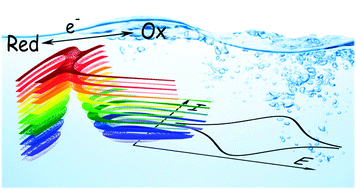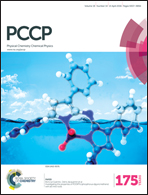Electrical double layer effects on ion transfer reactions
Abstract
The potential dependence of the thermodynamics and kinetics of ion transfer reactions as influenced by the electrical double layer are studied via two-dimensional free energy surfaces calculated with an extension of the Anderson-Newns Hamiltonian. The Gibbs energy difference between the reduced and oxidized states, the activation barrier and the resulting current–potential curves are investigated as a function of the potential of zero charge and the Debye length, which are applied to characterize the external electric field. It is found that the current–potential curves of different redox systems are distinctly affected by the electrical double layer depending on the charges of the solution-phase and adsorbed species. For the redox couples sensitive to double layer effects, it is shown that the external electric field can cause a decrease in the driving force for the ion transfer process, which leads to the reversible peak current deviating significantly from the ideal, Nernstian predictions and the effective transfer coefficient being less than 1 even though the ion transfer is kinetically fully reversible.


 Please wait while we load your content...
Please wait while we load your content...